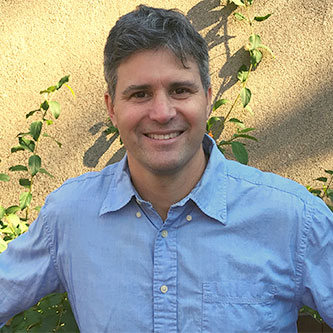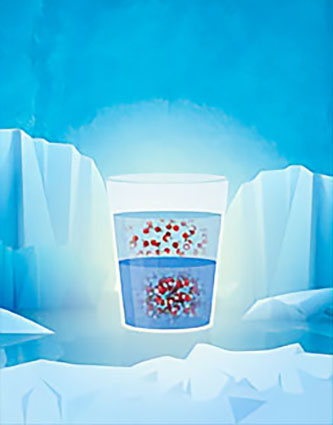Brooklyn College Professor Helps Researchers Prove Water Has Multiple Liquid States
Nov. 20, 2020

Brooklyn College Associate Professor Nicolas Giovambattista

Conceptual representation showing a glass containing two liquids of water separated by a thin interface. The bottom liquid is dense than the liquid at the top and, thus, shows that it is composed of water molecules closely packed.
A newly published Science journal paper reveals that water can exist as two liquids of differing density.
Brooklyn College Associate Professor Nicolas Giovambattista, chair of the Department of Physics and a member of the physics and chemistry Ph.D. programs at the CUNY Graduate Center, was part of an international team that helped prove that water has multiple liquid states, which has potential implications in low-temperature chemical and biochemical processes in aqueous environments. Their findings were published in the journal Science on November 20.
“What our study shows is that when water reaches approximately -63 degrees centigrade it can separate into two liquid states, with one liquid being 20 percent more dense than the other,” Giovambattista said. “This is a fundamental finding that explains naturally many of the anomalous properties of water at low temperatures.”
The possibility that water could exist in two different liquid states was proposed approximately 30 years ago, based on results obtained from computer simulations, Giovambattista added. This counterintuitive hypothesis has been one of the most important questions in the chemistry and physics of water, and a controversial scenario since its beginnings. This is because experiments that can access the two liquid states in water have been very challenging, due to the apparently unavoidable ice formation at the conditions where the two liquids should exist.
The usual “liquid” state of water that we are all familiar with corresponds to liquid water at normal temperatures (approximately 25 degrees centigrade). However, the paper shows that water at low temperatures (approximately -63 degrees centigrade) exists in two different liquid states, a low-density liquid at low pressures and a high-density liquid at high pressures. These two liquids have noticeable different properties and differ by 20 percent in density. The results imply that at appropriate conditions, water should exist as two immiscible liquids separated by a thin interface similar to the coexistence of oil and water.
What it Means
Water is a ubiquitous liquid with many highly unique properties. The way it responds to changes in pressure and temperature can be completely different from other liquids that we know, and these properties are essential to many practical applications and, particularly, to life as we know it. What causes many of these anomalies has long been a source of scientific inspiration with many potential theoretical explanations. This research proved that water can exist in two different liquid states, which can explain many of water’s anomalous properties. The team used complex experiments and computer simulations, which Brooklyn College Associate Professor Nicolas Giovambattista worked on, to support their findings.
Because water is one of the most important substances on Earth—the solvent of life as we know it—its “phase behavior” plays a fundamental role in different various fields, including biochemistry, climate, cryopreservation, cryobiology, and material science, and in many industrial processes where water acts as a solvent, product, reactant, or impurity. It follows that unusual characteristics in water’s phase behavior, such as the presence of two liquid states, can affect numerous scientific and engineering applications.
“It remains an open question how the presence of two liquids may affect the behavior of aqueous solutions in general, and, in particular, how the two liquids may affect biomolecules in aqueous environments,” Giovambattista said. “This motivates further studies in the search of potential applications.”
The international team was led by Anders Nilsson, professor of chemical physics at Stockholm University, Sweden. The experiments, described as “science-fiction-like” by Giovambattista, were performed by colleagues from Stockholm University, Pohang University of Science and Technology and Pohang Accelerator Laboratory X-ray Free Electron Laser in Pohang, South Korea, and SLAC National Accelerator Laboratory in Menlo Park, California. The computer simulations were performed by Giovambattista and Peter H. Poole, professor at St. Francis Xavier University in Antigonish, Nova Scotia. The computer simulations played a very important role in the interpretation of the experiments, as these experiments are extremely complex and some observables are not accessible.






